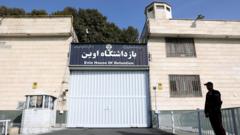Trump's recent statement suggesting a regime change in Iran clashes with official US policy and raises concerns of increased military tensions in the region.
Trump Proposes Regime Change in Iran Amid Military Actions

Trump Proposes Regime Change in Iran Amid Military Actions
Former President Donald Trump raises the prospect of leadership change in Iran following US and Israeli strikes on Iranian nuclear facilities, sparking debate among officials.
In a provocative social media post, former President Donald Trump implied the need for regime change in Iran after the United States, alongside Israel, conducted airstrikes targeting Iranian nuclear sites. On Sunday, Trump questioned, "why wouldn't there be a Regime change???" highlighting his ongoing opposition to the Iranian leadership and the urgency he sees in addressing their nuclear ambitions. These remarks, however, seem to contradict the stated intentions of current US officials, who clarified that the strikes aimed solely to hinder Iran's nuclear program without the goal of toppling its government.
Despite concerns from some quarters regarding Trump's stance, figures close to him, such as Elliott Abrams, a former Trump envoy to Iran, downplayed the seriousness of Trump's comments, suggesting they might reflect a more playful attitude rather than a concrete policy proposal. This follows a contentious weekend where Defense Secretary Pete Hegseth and Vice President JD Vance reiterated that regime change was not the objective of the military strike, which targeted three Iranian sites with advanced military technology.
The escalation in military engagement follows rising tensions between Israel and Iran, primarily instigated by Israeli Prime Minister Benjamin Netanyahu's determination to dismantle Iran's nuclear capabilities. Both leaders expressed alarm over Iran potentially crossing a threshold that would permit nuclear weapon development, a claim Iran has consistently refuted.
As the strikes were executed using high-tech munitions, Trump claimed they inflicted "monumental damage," although the full extent of the destruction remains uncertain. The UN’s nuclear watchdog has urged a ceasefire to allow for inspections, highlighting global anxieties regarding the consequences of such military actions.
Iran's government reacted strongly, vowing "everlasting consequences," while Israeli military reports indicated retaliatory missile launches from Iranian territory towards Israel, alongside strikes on Iranian airports. The United States has heightened troop readiness in the region, with 40,000 personnel now on alert, prompting a global warning from the State Department for American citizens to exercise increased caution.
Moreover, Iranian parliament has suggested an extreme measure to close the Strait of Hormuz, a vital trade corridor for oil and gas, which could severely disrupt global markets. In response, US Secretary of State Marco Rubio has called for China's intervention to discourage Iran from taking such actions.
The recent military moves come amidst Trump's previously expressed desire to withdraw from prolonged conflicts, reflected in his campaign rhetoric about not engaging in "forever wars," raising skepticism about the consistency of his foreign policy approach. Some lawmakers, including Republican Congressman Thomas Massie, have criticized Trump's military engagements as unconstitutional, arguing that congressional approval is necessary for such military actions.
Despite their differences, some Republicans, like Vice President Vance, acknowledge Trump's strategy as offering a degree of trust, asserting that Trump's use of military force aims to protect American interests rather than embroiling the nation in endless warfare.





















